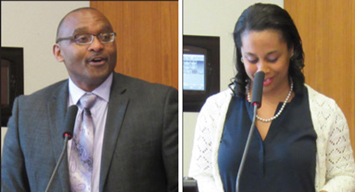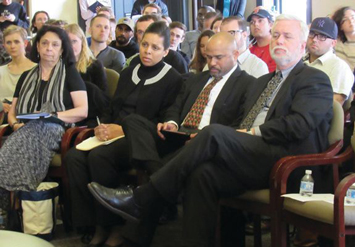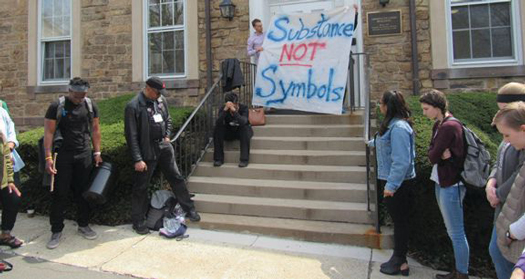, Contributing Writer

PRINCETON, N.J.–Like many colleges and universities, the Princeton Theological Seminary has rediscovered a past intertwined with the heinous African slave trade. What separates the school from others is that it has an opportunity to make material redress for the sins of its past.
The school held an academic conference April 8-9 titled “Legacy and Mission: Theological Education and the History of Slavery.” The meeting held on its campus was based on spiritual concepts and the notion presented was the same Bible used to validate slavery should be used to justify repenting for those sins through reparations. With atonement a central part of the Christian faith, many panelists and presenters said religion should be leading the call for post-slavery repair.
The conference was a direct response to a two-year research study began by seminary President Craig Barnes called “Princeton Seminary and Slavery.” His research found, in part, that the seminary did not own slaves, nor use slaves to construct buildings. It did get money from slaveholders. “The Seminary’s founders and first faculty members had a complicated relationship to slavery. They often spoke powerfully against the institution of slavery, yet at the same time, they could not imagine a world in which Blacks and Whites lived side by side in equality. In some cases, they used slave labor themselves,” the report said.

Princeton Theological Seminary is a private, nonprofit, and independent graduate school of theology in Princeton, New Jersey. Founded in 1812 under the direction of Archibald Alexander, the General Assembly of the Presbyterian Church, and the College of New Jersey, it is the second-oldest seminary in the United States.
Acting as a moral compass while adding voice and pressure in encouraging the school to reconcile its past was a Black student group, the Association of Black Seminaries, which called for “material equity.” Rebecca Guillory Gilmer, a master of divinity student and a member of the executive board of the student group, told The Final Call, “The students have crafted a response drawing from the historical audit on slavery produced by the seminary and drawing from the document. They found that about 15 percent of the seminary’s revenue from 1812 to 1861 was a product of donations from slave owners. As a result, the students are calling for the institution to set 15 percent of what the seminary uses from its endowment for its operating expenses to fund tuition grants for Black students and establish a Black Church Studies program.”
It has been reported that this amount would total approximately $5.3 million annually.
Charles Gilmer, a 2018 graduate of the school and alumni consultant to the ABS, went deeper into the student demands. He told The Final Call the requirements of the students are threefold: “First we are calling for scholarships for Black students, Liberian students, given the school’s history with that colonization effort, and West African students. As well as to fund a sustainable and robust Black church studies program.”
Mr. Gilmore added that Black students graduate with nearly twice the debt load of their White counterparts. “We would like to see Black and African students leave here without ongoing financial responsibilities, debt which is typically the case from this institution,” he said.

A petition circulated by the students also calls for partnerships with historically Black colleges, partnerships with accredited West African universities and seminaries with Presbyterian affiliations, such as the Liberia Baptist Theological Seminary, Trinity Theological Seminary, Legon, Ghana, and others. There should be continued efforts to increase Black faculty and administrators as well as continue “efforts to decenter the curriculum from its Eurocentric bias,” the petition adds.
As a result of the history of slavery audit, a historical audit task force was formed by the seminary in the fall 2018 to oversee public events and discussions of the audit report. This group, comprised of faculty, administrators, students, alumni, and trustees, will make a formal set of recommendations to the Board of Trustees in May 2019. It was the task force that was responsible for the conference.
Ms. Keri Day, a professor of theology and African American religion, who sits on the task force making recommendations, said, “Over the last year we have been talking to student groups, community groups, alumni about how they envision slavery and reparations in light of the report and it will conclude with a slate of recommendations being forwarded to the board of directors.”
“We hope and pray the board will take into account what we the task force is forwarding as recommendations that we have heard from the student body, facility, and community,” she said.
Dr. Brad R. Braxton, director of the Center for the Study of African American Religious Life and the supervisory curator of religion at the Smithsonian National Museum of African American History and Culture in Washington, was a keynote presenter at the conference. During his remarks, he noted that in this country “White mania is unleashed by competent Black leadership.”
“This conference is important because at the root of what we do as institutions of higher learning, particularly a religious institution, we are called to shape the frameworks in which people can see new and better futures. This conference ultimately is about the look back that can help us conceive of a stronger and more just future.”
Current student president of the ABS Justin Henderson said he is somewhat discouraged with word the board of trustees will not make an immediate decision regarding the demands after the May meeting. “So it is disheartening. Expedience is not necessarily a sign of irresponsibility,” he said.
Nicholas Young, the new ABS president and master of divinity student, was chairperson of the slave audit response committee. He told The Final Call it is clear what students are up against. There are mountains to be climbed and prayers to be said, he noted. “I think there is institutional resistance or trepidation with moving in a right direction. There should be no gradualism when it comes to repentance. So I’m having a hard time dealing with this gradualist approach for something wrong for 400 years.”












